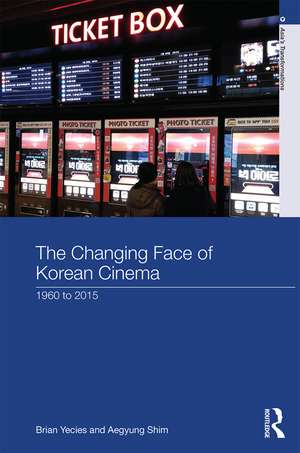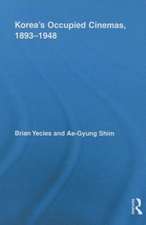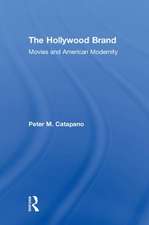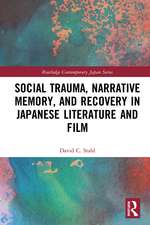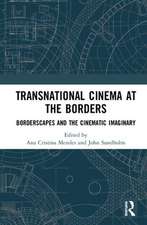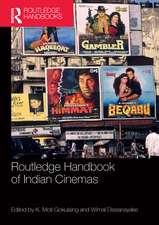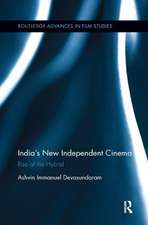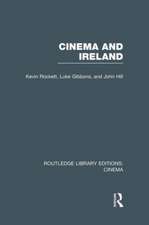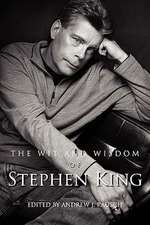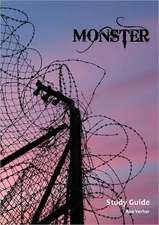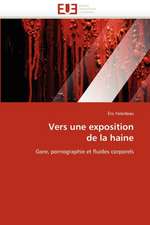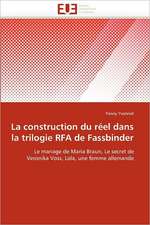The Changing Face of Korean Cinema: 1960 to 2015: Asia's Transformations
Autor Brian Yecies, Aegyung Shimen Limba Engleză Hardback – 14 dec 2015
This book examines the ways in which South Korean cinema has undergone a transformation from an antiquated local industry in the 1960s into a thriving international cinema in the 21st century. It investigates the circumstances that allowed these two eras to emerge as creative watersheds, and demonstrates the forces behind Korea’s positioning of itself as an important contributor to regional and global culture, and especially its interplay with Japan, Greater China, and the United States. Beginning with an explanation of the understudied operations of the film industry during its 1960s take-off, it then offers insight into the challenges that producers, directors, and policy makers faced in the 1970s and 1980s during the most volatile part of Park Chung-hee’s authoritarian rule and the subsequent Chun Doo-hwan military government. It moves on to explore the film industry’s professionalization in the 1990s and subsequent international expansion in the 2000s. In doing so, it explores the nexus and tensions between film policy, producing, directing, genre, and the internationalization of Korean cinema over half a century.
By highlighting the recent transnational turn in national cinemas, this book underscores the impact of developments pioneered by Korean cinema on the transformation of ‘Planet Hallyuwood’. It will be of particular interest to students and scholars of Korean Studies and Film Studies.
| Toate formatele și edițiile | Preț | Express |
|---|---|---|
| Paperback (1) | 341.32 lei 22-36 zile | +21.81 lei 5-11 zile |
| Taylor & Francis – 28 iun 2018 | 341.32 lei 22-36 zile | +21.81 lei 5-11 zile |
| Hardback (1) | 1112.34 lei 43-57 zile | |
| Taylor & Francis – 14 dec 2015 | 1112.34 lei 43-57 zile |
Din seria Asia's Transformations
-
 Preț: 282.38 lei
Preț: 282.38 lei -
 Preț: 267.92 lei
Preț: 267.92 lei -
 Preț: 341.32 lei
Preț: 341.32 lei - 18%
 Preț: 1220.46 lei
Preț: 1220.46 lei -
 Preț: 447.51 lei
Preț: 447.51 lei - 18%
 Preț: 1060.87 lei
Preț: 1060.87 lei -
 Preț: 489.44 lei
Preț: 489.44 lei -
 Preț: 446.58 lei
Preț: 446.58 lei - 18%
 Preț: 1003.43 lei
Preț: 1003.43 lei -
 Preț: 488.29 lei
Preț: 488.29 lei -
 Preț: 449.41 lei
Preț: 449.41 lei - 26%
 Preț: 822.54 lei
Preț: 822.54 lei - 18%
 Preț: 1225.22 lei
Preț: 1225.22 lei -
 Preț: 416.44 lei
Preț: 416.44 lei - 18%
 Preț: 1389.36 lei
Preț: 1389.36 lei - 18%
 Preț: 1062.98 lei
Preț: 1062.98 lei -
 Preț: 483.49 lei
Preț: 483.49 lei -
 Preț: 452.31 lei
Preț: 452.31 lei -
 Preț: 416.22 lei
Preț: 416.22 lei -
 Preț: 438.14 lei
Preț: 438.14 lei -
 Preț: 411.42 lei
Preț: 411.42 lei -
 Preț: 443.65 lei
Preț: 443.65 lei - 18%
 Preț: 1055.51 lei
Preț: 1055.51 lei - 18%
 Preț: 1054.27 lei
Preț: 1054.27 lei -
 Preț: 448.44 lei
Preț: 448.44 lei - 25%
 Preț: 573.10 lei
Preț: 573.10 lei - 28%
 Preț: 821.46 lei
Preț: 821.46 lei - 18%
 Preț: 1337.43 lei
Preț: 1337.43 lei - 18%
 Preț: 1055.51 lei
Preț: 1055.51 lei - 18%
 Preț: 1059.45 lei
Preț: 1059.45 lei - 15%
 Preț: 547.89 lei
Preț: 547.89 lei -
 Preț: 450.15 lei
Preț: 450.15 lei -
 Preț: 489.26 lei
Preț: 489.26 lei - 18%
 Preț: 1110.77 lei
Preț: 1110.77 lei -
 Preț: 411.42 lei
Preț: 411.42 lei -
 Preț: 453.96 lei
Preț: 453.96 lei - 24%
 Preț: 337.22 lei
Preț: 337.22 lei - 26%
 Preț: 186.91 lei
Preț: 186.91 lei
Preț: 1112.34 lei
Preț vechi: 1356.52 lei
-18% Nou
Puncte Express: 1669
Preț estimativ în valută:
212.84€ • 222.82$ • 176.12£
212.84€ • 222.82$ • 176.12£
Carte tipărită la comandă
Livrare economică 07-21 aprilie
Preluare comenzi: 021 569.72.76
Specificații
ISBN-13: 9780415707657
ISBN-10: 041570765X
Pagini: 304
Ilustrații: 60
Dimensiuni: 156 x 234 x 15 mm
Greutate: 0.54 kg
Ediția:1
Editura: Taylor & Francis
Colecția Routledge
Seria Asia's Transformations
Locul publicării:Oxford, United Kingdom
ISBN-10: 041570765X
Pagini: 304
Ilustrații: 60
Dimensiuni: 156 x 234 x 15 mm
Greutate: 0.54 kg
Ediția:1
Editura: Taylor & Francis
Colecția Routledge
Seria Asia's Transformations
Locul publicării:Oxford, United Kingdom
Public țintă
Postgraduate and UndergraduateCuprins
Introduction: Introducing "Planet Hallyuwood" Part 1: The Golden Age of the 1960s 1 Hypergrowth of the Propaganda Factory and the Producing Paradox 2 At the Crossroads of Directing and Politics 3 Genre Intersections and the Literary Film 4 Feasting on Asian Alliances: Hong Kong Co-productions and Japanese Remakes Part 2: The Dark Age of the 1970s and Hollywood’s Domination in the Aftermath 5 Policy and Producing Under Hollywood’s Shadow in the 1970s and 1980s 6 Robust Invalids in a New Visual Era: Directing in the 1970s and 1980s 7 Weapons of Mass Distraction: The Erotic Film Genres of the 1970s and 1980s Part 3: The Golden Age of the Post-censorship Era 8 The Rise of the New Corporate and Female Producers 9 The Rise of the Female Writer–Director and the Changing Face of Korean Cinema10 Genre Transformations in Contemporary Korean Cinema 11 Korean Transnational Cinema and the Renewed Tilt Toward China 12 Conclusion Welcome to Planet Hallyuwood
Notă biografică
Brian Yecies is a Senior Lecturer in Cultural Studies at the University of Wollongong, Australia.
Aegyung Shim is a past Korea Foundation Postdoctoral Research Fellow at the Institute for Social Transformation Research (ISTR) at the University of Wollongong, Australia.
Aegyung Shim is a past Korea Foundation Postdoctoral Research Fellow at the Institute for Social Transformation Research (ISTR) at the University of Wollongong, Australia.
Recenzii
'This volume makes a valuable supplement to the existing scholarship on the Korean film industry... '
Jinhee Choi, King’s College London, London, United Kingdom
Jinhee Choi, King’s College London, London, United Kingdom
Descriere
This book examines the ways in which South Korean cinema has undergone a transformation from an antiquated local industry in the 1960s into a thriving international cinema in the 21st century. It investigates the circumstances that allowed these two eras to emerge as creative watersheds, and demonstrates the forces behind Korea’s positioning of itself as an important contributor to regional and global culture, and especially its interplay with Japan, Greater China, and the United States.
